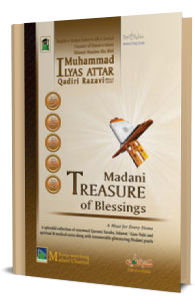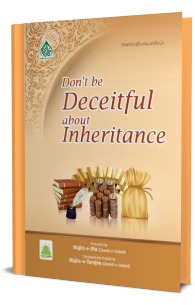Shar’i rulings regarding Islamic Sisters
Dowry and inheritance
Mufti Muhammad Haashim Attari Madani
Question: What do the honourable scholars say about the following: some people marry off their sisters after the death of their father. They cover the costs of the wedding and dowry using the inheritance from their father which had multiple shares. When it comes to discussing matters of inheritance, they do not give their sisters their share and say: “In exchange for their share of inheritance, we married them off and provided their dowry. Therefore, they will not receive a share from the inheritance.”
However, when the marriage and dowry were paid for, it was not mentioned that these things are being paid for in exchange for the bride’s share of inheritance.
My questions are as follows:
1. According to the shari’ah, is such a claim made by the brothers valid?
2. In the given scenario, if it is necessary to give the sisters their share, what is the punishment for those who do not give a woman their rightful share of inheritance?
Answer:
بِسْمِ اللّٰہِ الرَّحْمٰنِ الرَّحِیْمِ
اَلْجَوَابُ بِعَوْنِ الْمَلِکِ الْوَھَّابِ اَللّٰھُمَّ ھِدَایَۃَ الْحَقِّ وَالصَّوَابِ
1. It is categorically wrong for the brothers to claim: “In exchange for their share of inheritance, we married them off and provided their dowry. Therefore, they will not receive a share from the inheritance.” If the one whose inheritance is being distributed had daughters, it is necessary for them to be given their share. Whatever the brothers spent on their sister’s dowry and wedding will not be deducted from her share of inheritance, nor will this cancel out her shares in their entirety. This is because the dowry and any other expenses the brothers covered without making an agreement will be regarded as a favour and gift on their behalf.
The details of this are as follows: although the brothers paid for the dowry and wedding using the wealth from the inheritance (consisting of multiple shares), it was not mentioned at the time of paying that these costs are being covered in exchange for their sister’s share of the inheritance or that the sister will no longer have a share in a particular part [of the inheritance].
Moreover, neither is it the case that the sister’s share was taken from the inheritance and spent on the wedding and dowry. This is not a case of reconciliation (sulh) and mutual withdrawal (takhaaruj), as the sister’s share is not cancelled out (saaqit) from the entire inheritance or from a particular category. The sisters did not think that they no longer can claim their share. Therefore, the costs of the marriage and dowry will not be deducted from the shares of the sisters. These payments will be considered as a voluntary contribution and goodwill on behalf of the brothers.
2. The matter of not giving a woman her share of inheritance was common before Islam during the age of ignorance. However, Islam honoured women, and just like men, women were also granted a rightful claim to inheritance. Anyone who now makes excuses to stop a woman from receiving her share of inheritance is an oppressor and usurper.
If someone forcefully deprives a female inheritor of her rightful share of inheritance and usurps her share, he will be given a severe punishment. On the Day of Judgement, a collar will be made using the earth’s seven layers and placed around his neck. He will sink into the seven layers of the earth and bear the punishment of digging up the earth’s seven layers and carrying their load until the Day of Judgement. None of his actions will be accepted.
وَاللہُ اَعْلَمُ عَزَّوَجَلَّ وَ رَسُوْلُہٗ اَعْلَم صلَّی اللہ علیہ واٰلہٖ وسلَّم


















Comments